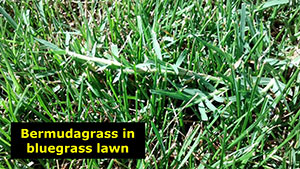 Bermudagrass is becoming a common weed in many Colorado lawns and landscape/garden beds, and can be especially problematic during very warm summers. It is often confused with crabgrass because their seed heads are similar.
Bermudagrass is becoming a common weed in many Colorado lawns and landscape/garden beds, and can be especially problematic during very warm summers. It is often confused with crabgrass because their seed heads are similar.
What is bermudagrass?
Bermudagrass is a perennial, warm-season grass. It will begin greening up in late April or early May, depending on how warm it is in the spring.
How does bermudagrass spread?
While it can form seed, the main way that this grass spreads is via underground, laterally growing stems called rhizomes – and by aboveground, creeping stolons (runners). This aggressive creeping growth habit allows bermudagrass to spread rapidly in lawns and gardens. Attempts to control this weedy grass by pulling and digging are almost always unsuccessful.
Can I spray herbicide to eradicate bermudagrass?
Garden areas invaded by bermudagrass can be sprayed with an herbicide containing fluazifop (Grass-B-Gone). Read the label carefully before using, but it can be safely sprayed over most shrubs and flowers beginning in the early spring when bermudagrass begins growth. Several applications (every 2-4 weeks) during the summer when the bermudagrass is actively growing will be necessary to successfully control this weed. For a few years following control, scout the affected for any regrowth of the bermudagrass. Note that applications of any herbicide for bermudagrass control are INEFFECTIVE if the bermudagrass is brown/dormant (spring and/or fall).
Can I selectively control bermudagrass?
When growing in bluegrass, ryegrass, or fescue lawns, bermudagrass can be selectively controlled by using the herbicide Tenacity (mesotrione). Multiple applications of the herbicide will be required throughout the summer – and should not be started until bermudagrass has begun greening up in late spring. Tenacity will cause the bermudagrass to turn a bright white color, an indicator that it is working effectively. Note that Tenacity is NOT labeled for use in non-lawn parts of the landscape. Follow all directions for mixing and application of Tenacity to ensure effectiveness in controlling bermudagrass and to prevent injure to desirable turf.
What products control bermudagrass non-selectively?
Products containing the herbicide glyphosate can be used to NON-SELECTIVELY manage bermudagrass in lawns and to spot treat bermudagrass in gardens. Glyphosate is a non-selective herbicide, which means it will kill all plants which are sprayed. When using glyphosate to manage bermudagrass in lawns, spray an area extended 2-3 feet out from the spot where bermudagrass is observed growing in order to control stolons/runners that are difficult to seed. A single application of glyphosate will NOT successfully control a bermudagrass infestation in a lawn. Apply the glyphosate to the area 2-3 more times during the growing season (every 3-4 weeks after the initial application) to kill any reappearing bermudagrass. In some cases, treatment with glyphosate may be necessary for two or three years before bermudagrass is completely controlled. Once the bermudagrass is eliminated, the dead area can be reseeded or resodded.


